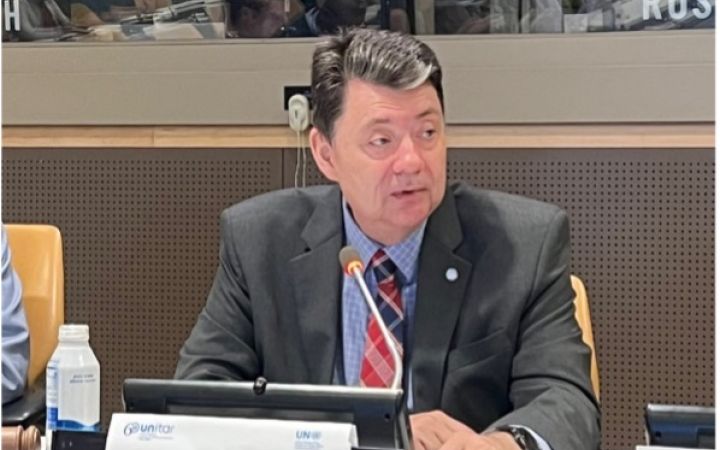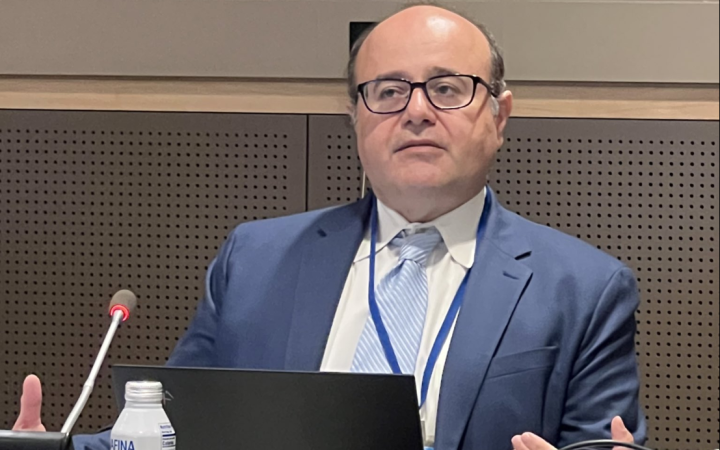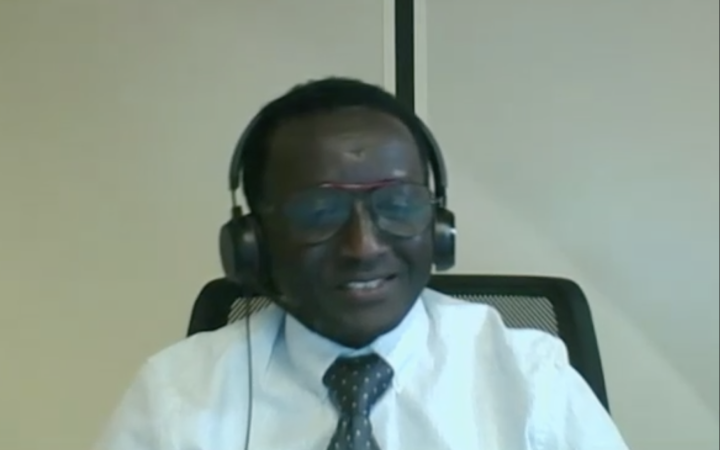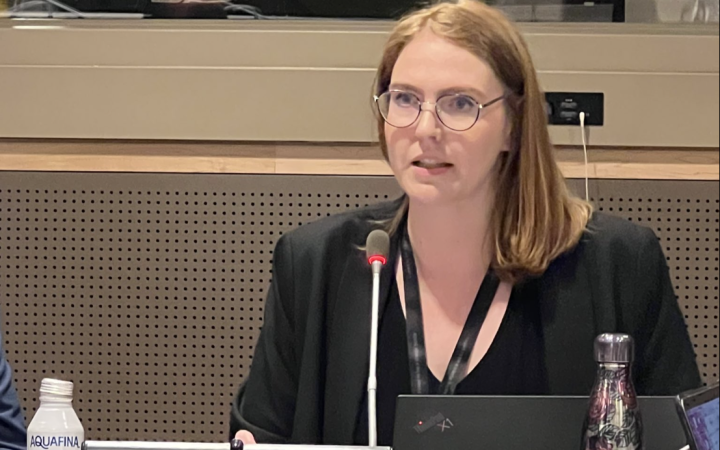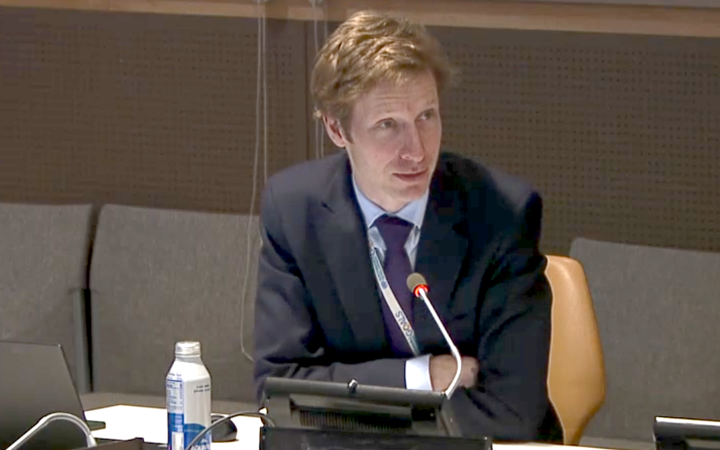20 March 2023, New York, USA – The United Nations Institute for Training and Research (UNITAR), New York Office and its partner the Division for Ocean Affairs and the Law of the Sea (DOALOS) of the Office of Legal Affairs of the United Nations successfully held the second briefing on the Introduction to the UN Fish Stocks Agreement and Sustainable Fisheries Processes at the United Nations, on Monday, 15 May 2023. The workshop was held in the United Nations Headquarters and was facilitated by Mr Dmitry Gonchar, Mr Buba Bojang, Mr Bart Smit Duijzentkunst, Mr Michele Ameri, and Ms Amber Maggio.
Mr Dmitry Gonchar, Principal Legal Officer at DOALOS, started the session by delivering the opening remarks. This is the second event of the joint training program between both organizations to build capacity in ocean affairs and the law of the sea for New York delegates. He explained that this introduction will contribute to the building of capacity and the empowerment of participants with the relevant knowledge to achieve the UNITAR-DOALOS common goals. He then thanked Mr. Marco Suazo and the UNITAR team for their cooperation and for organizing the program, as well as the Food and Agriculture Organization of the United Nations for making a virtual presentation for the program.
Then, Mr Michele Ameri gave a summary of the presentation and showed a short video on the United Nations Convention on the Law of the Sea (UNCLOS), which governs how countries interact with the ocean and provides a framework to protect the environment. He then tackled the first module on the law of the sea framework for sustainable fisheries. According to Mr Michele Ameri, fisheries and their regulations are very important as they are a vital source of food, employment, business and international trade. However, they face huge challenges related to unsustainability, while effective fisheries management improves stock sustainability. The UNCLOS divides the sea into multiple maritime zones, and when it comes to fisheries, we are talking about the territorial sea, the exclusive economic zone and the high seas. In the territorial sea, coastal states have full authority over maritime species. In the exclusive economic zone, coastal states also have sovereignty over the majority of maritime resources, but these rights are coupled with conservation and management responsibilities, which implies the sustainable use of fisheries. Finally, the High Seas offer freedom to fish qualified by international treaties, with duties to cooperate in the conservation and management of stocks. UNCLOS also establishes cooperation regimes related to shared fish stocks. However, there were some shortcomings that the United Nations Fish Stocks Agreement (UNFSA) came to fix.
Afterwards, Mr Buba Bojang and Mr Blaise Kuemlangan from the Food and Agriculture Organization of the United Nations (FAO) took the floor to speak about the FAO fisheries instruments and bodies. The FAO was established to defeat hunger, malnutrition and poverty, and achieve food security through forums, technical assistance and knowledge. When it comes to fisheries governance, the Committee on Fisheries conducts periodic reviews of global fisheries issues and examines their possible solutions. Some of FAO’s instruments are the FAO Code of Conduct for Responsible Fisheries, the FAO Compliance Agreement and the FAO Port State Measures Agreement. The FAO also has instruments to tackle the issue of Illegal, Unreported and Unregulated (IUU) fishing, namely the 2009 Agreement on Port State Measures which is binding, along with other binding ones, such as the 2001 IPOA-IUU or the 2022 VG on Transshipment. The FAO also has Regional Fisheries Management Organizations (RFMOs) to ensure cooperation and compliance, such as ICCAT and IOTC. After the presentation, Mr Bojang and Mr Kuemlangan answered some questions from attendees.
Ms Amber Maggio then spoke about sustainable fisheries bodies and processes at the United Nations. Some of the bodies established by UNCLOS are the International Tribunal for the Law of the Sea (ITLOS), the Meeting of States Parties, and the UNFSA Review Conference which assesses the efficiency of the agreement and provides recommendations. Ms Maggio also talked about the UN General Assembly processes in relation to fisheries: the Annual Resolutions, review of the impact of bottom fishing, bans on high-seas drift-net fishing and sustainable development instruments. She also touched on the Regular Process and the Sustainable Development Goals (SDG 14). Ms Maggio finished by mentioning the other principal organs of the United Nations that have mandates related to fisheries, such as the Security Council, the International Court of Justice, the Economic and Social Council and the Secretariat.
Finally, Mr Bart Smit Duijzentkunst talked about capacity building and trust funds. One of the priorities for DOALOS is to help States with application and implementation processes through capacity building, which is a needs-based project. It offers training courses, technical cooperation and advice. The DOALOS capacity-building program can be split into Technical cooperation multilateral and bilateral programmes. These activities are helped through Trust Funds which aim at implementing UNCLOS and ensuring participation in General Assembly processes. DOALOS also provides fellowships and training, as well as outreach and publications, which include activities such as UN World Oceans Day.
Mr. Marco Suazo concluded the session by thanking the panellists and giving closing remarks.


